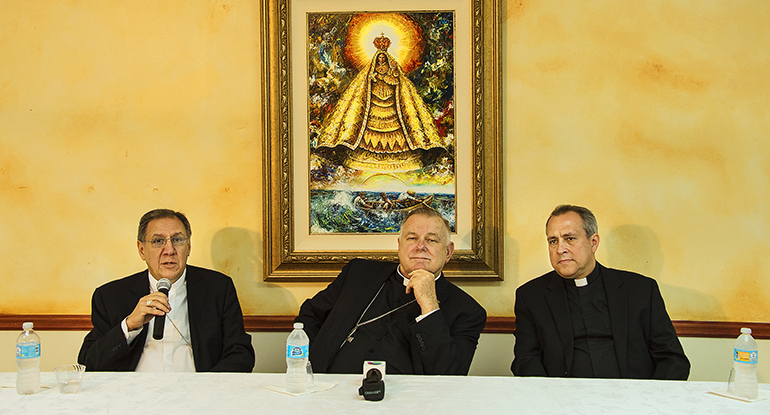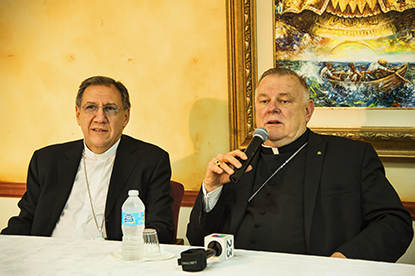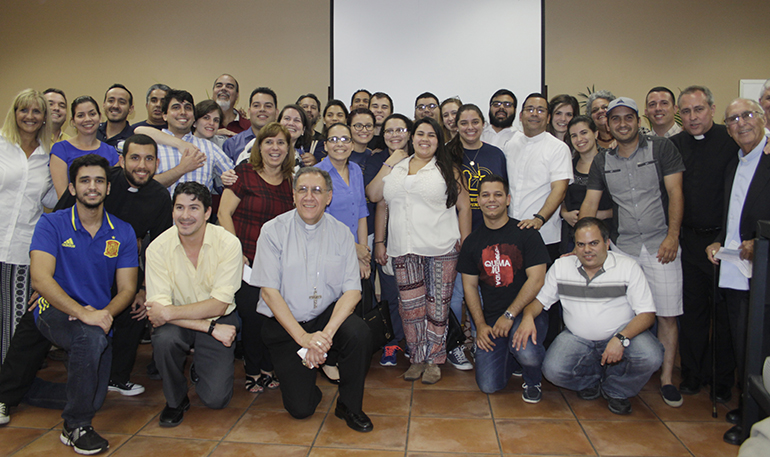By Daniel Shoer Roth - [email protected]

Photographer: JUAN BELTRAN | FC
File photo of the Cuba-Diaspora Ecclesial Encounter 2016 at Shrine of Our Lady of Charity, in Miami. From left, Bishop Arturo González of Santa Clara, Cuba, Archbishop of Miami, Thomas Wenski and Father José Alvarez, pastor of Our Lady of the Lakes in Miami Lakes and coordinator of the Encounter for the Archdiocese of Miami, announced achievements and conclusions of the 19th previous Ecclesial Encounters.
MIAMI | In the mid-1990s, contacts between Catholics in Cuba and those in exile intensified. The goal was to renew the ties between Cubans and to reflect together on topics related to the Church. This represented an initial step toward mutual understanding and cooperation, as both communities had experienced vastly different realities in previous decades, and often had distorted perceptions of one another.This framework gave birth 20 years ago to the Cuba-Diaspora Ecclesial Encuentro, an annual meeting of significant symbolic value that has served as a platform for unity, goodwill and reconciliation between Cuban clergy and laity on both shores.
This framework gave birth 20 years ago to the Cuba-Diaspora Ecclesial Encuentro, an annual meeting of significant symbolic value that has served as a platform for unity, goodwill and reconciliation between Cuban clergy and laity on both shores.“In all these years, the main achievement is a deeper understanding of the reality of Cuban life and the life of the Church in Cuba and here in the diaspora, because there are always misunderstandings and certain prejudices that arise in popular culture. But sharing helps to heal wounds,” said Father José Alvarez, pastor of Our Lady of the Lakes in Miami Lakes and coordinator of the Encuentro for the Archdiocese of Miami.
“In all these years, the main achievement is a deeper understanding of the reality of Cuban life and the life of the Church in Cuba and here in the diaspora, because there are always misunderstandings and certain prejudices that arise in popular culture. But sharing helps to heal wounds,” said Father José Alvarez, pastor of Our Lady of the Lakes in Miami Lakes and coordinator of the Encuentro for the Archdiocese of Miami.“In the early years, these wounds were more pronounced, and conversations were sometimes oriented toward political issues, though that was not their purpose. As time has passed, there may be times when those issues arise, but they do not prevail. We focus on the ecclesial, the pastoral,” said the Cuban priest. Father Alvarez will lead a delegation from the United States that will participate June 19-24 in the 20th Cuba-Diaspora Ecclesial Encuentro. Given the anniversary’s importance, it will take place in El Cobre, home of the National Shrine of Our Lady of Charity, one of the sacred places most revered by the Cuban people.
“In the early years, these wounds were more pronounced, and conversations were sometimes oriented toward political issues, though that was not their purpose. As time has passed, there may be times when those issues arise, but they do not prevail. We focus on the ecclesial, the pastoral,” said the Cuban priest. Father Alvarez will lead a delegation from the United States that will participate June 19-24 in the 20th Cuba-Diaspora Ecclesial Encuentro. Given the anniversary’s importance, it will take place in El Cobre, home of the National Shrine of Our Lady of Charity, one of the sacred places most revered by the Cuban people.The Encuentro, hosted by Bishop Arturo González of Santa Clara, will be a combination of meetings, panels, presentations, prayers, concerts and trips to places of interest in Santiago de Cuba. For example, one of the plenary sessions is titled “Looking to the Future,” where participants will analyze the concrete results obtained in the past 20 years and, faced with a very different scenario to that of 1997, what are the present challenges as well as strengths that must be sustained to keep going. Participants will also evaluate how Cuban migration has changed in recent times and how the Church can support it.
The Encuentro, hosted by Bishop Arturo González of Santa Clara, will be a combination of meetings, panels, presentations, prayers, concerts and trips to places of interest in Santiago de Cuba. For example, one of the plenary sessions is titled “Looking to the Future,” where participants will analyze the concrete results obtained in the past 20 years and, faced with a very different scenario to that of 1997, what are the present challenges as well as strengths that must be sustained to keep going. Participants will also evaluate how Cuban migration has changed in recent times and how the Church can support it.Among the members of the Miami delegation is Guillermo Fernandez-Toledo, professor of theology at Belen Jesuit Prep and of ecclesiastical history at the Southeast Pastoral Institute (SEPI). Since 2014, he has been a member of the Miami group coordinating the Encuentro. He spoke about this with La Voz Catolica.

Photographer: JUAN BELTRAN | FC
File photo of the Cuba-Diaspora Ecclesial Encounter 2016 at Shrine of Our Lady of Charity, in Miami. Bishop Arturo González of Santa Clara, Cuba, and Archbishop of Miami, Thomas Wenski announced achievements and conclusions of the 19th previous Ecclesial Encounters.
Among the members of the Miami delegation is Guillermo Fernandez-Toledo, professor of theology at Belen Jesuit Prep and of ecclesiastical history at the Southeast Pastoral Institute (SEPI). Since 2014, he has been a member of the Miami group coordinating the Encuentro. He spoke about this with La Voz Catolica.Q: What have been the major contributions of the meetings?
Q: What have been the major contributions of the meetings?
A: To have created bridges between us, Catholics of the diaspora, with our Catholic brothers of the island; to know each other and to help when it has been necessary. For example, many of our members had never visited Cuba after their departure, and have already done so. Others have helped in different ways and, on a personal level, have gone to teach courses on a theological subject in the different schools of formation of the Cuban dioceses.
Q: What issues of importance will be on the agenda of this meeting?
A: We will talk about our mutual ecclesial realities. We always do this. They give us their overview of the Church at this time, and we present ours. This year, Father Alvarez will report on the services he has coordinated, with the approval of Archbishop Thomas Wenski, to advise newcomers on welfare assistance, whether social or legal. We will visit the easternmost region, Baracoa, devastated by last year’s hurricane, and offer some kind of help to people of the affected communities.
Q: As diverse groups, what are the most urgent needs and challenges you face to continue fostering the relationships?
A: There are always needs, and many. We try to focus on those in which we are asked for some kind of help, such as the publication of materials. Relations have been fruitful because, after a long time of disconnect between one place and the other, they come here and find familiar faces, and the same happens with people from Miami who visit Cuba. The biggest challenges are initiatives that often arise and, for some reason or another, cannot be carried out.
Q: Who will participate in the Miami delegation?
A: We are 20, approximately, among them Father Alvarez; other priests such as Father Juan Sosa; deacons such as Juan Enrique Gonzalez; religious such as Claretian Sister Ondina Cortes, and Daughter of Charity Sister Eva Perez-Puelles; and laity in general, not only from Miami, but from other parts of the United States and Puerto Rico.
Q: What has been the role of the Archdiocese of Miami in successfully carrying out these meetings?
A: Since the beginning in 1997, the Archdiocese of Miami has facilitated and helped in all our meetings. It has demonstrated its concern for them by appointing a director so that they would not end. It has hosted on many occasions. And it maintains close ties and affection with all the dioceses of Cuba. Archbishop Wenski and Bishop Arturo González of Santa Clara, who was commissioned by the Conference of Cuban Bishops for this work, maintain a fluid communication in everything related to these meetings and other matters of ecclesial interest.Q: What is the importance of celebrating the 20th anniversary in El Cobre?A: We will celebrate it at the national shrine of our patroness in El Cobre, as an offering to her and wishing that she will bless us and help us to continue this ecclesial work.
Q: What is the importance of celebrating the 20th anniversary in El Cobre?
A: We will celebrate it at the national shrine of our patroness in El Cobre, as an offering to her and wishing that she will bless us and help us to continue this ecclesial work.

Photographer: ROCIO GRANADOS | LVC
File photo in which appear representatives of the Church of Cuba and Miami who attended the Cuba-Diaspora Ecclesial Encuentro with young people, on June 22, 2016, at St. Timothy Church, Miami.

